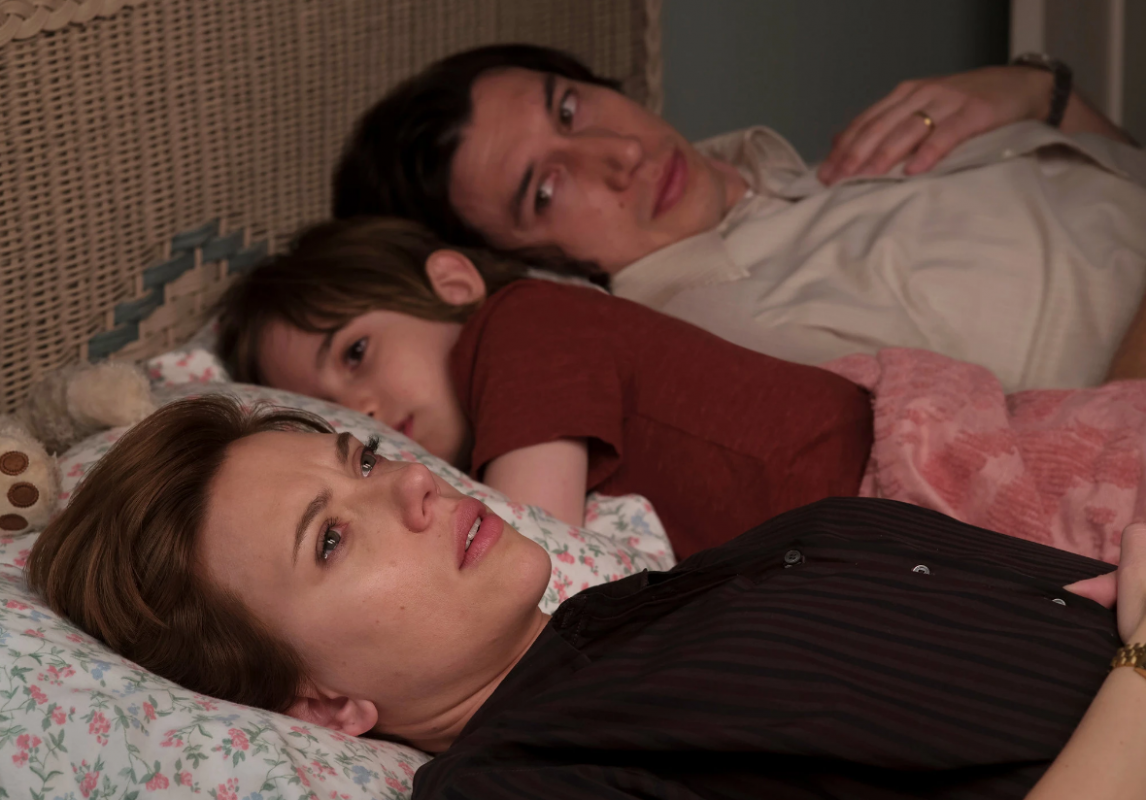
Divorce is sad. It’s especially sad when there are kids involved, but it’s sad no matter what: two people who once loved each other, who committed to each other, who built a life together, realizing they just can’t do it anymore. And it’s fairly easy to convey this sadness in a film: Show the two protagonists as a happy couple—maybe include their meet-cute, his teary-eyed first glance at her walking down the aisle, the joyful birth of their child—and then show the aftermath of that broken bond. But Noah Baumbach does something with a higher degree of difficulty in Marriage Story. When we first meet Nicole (Scarlett Johansson) and Charlie (Adam Driver), they are describing what they love about each other (“She is a mother who plays”; “He cries easily in movies”), but it’s an exercise in a mediator’s office. They’ve already split up. The marriage is over.
It didn’t end in a dramatic fashion. Yes, there was an affair (his) but by that point, the relationship was already broken. They simply realized they couldn’t make it work any longer.
At a young age, Nicole, who grew up in Hollywood with an actress mother, made a teen movie that hit it big (a la Fast Times at Ridgemont High? Baumbach was once married to the actress Jennifer Jason Leigh). She could’ve stayed in L.A., been a screen actress, but instead she went to an avant-garde theater production where she fell in love with the hulking actor on stage. It turns out he was also the director. His name was Charlie.
She moved to New York and her life became subsumed by his. Not in the traditional, staying-home-to-raise-the-child way—they were both good, involved parents to their young son Henry (Azhy Robertson)—but she joined his theater troupe, became his actress muse. And one day she looked up and realized she was a New Yorker, in an apartment decorated in his taste, living a life that he had dreamed of, but she hadn’t. So they separated.
Nicole goes to LA to film a pilot and hires a feminist lawyer Nora Fanshaw (Laura Dern) who more than lightly encourages her to lean in and get what’s hers. She presents the most unsavory version of Charlie to Nicole. Meanwhile, Charlie first visits his own shark of a lawyer (Ray Liotta) but thinks he’s too aggressive (not to mention too expensive) so instead he settles for the mild-mannered, slightly doddering Bert Spitz (Alan Alda). He thinks the divorce will be simple. Two people who once really loved each other, amicably splitting up their lives. On a visit to LA, he goes to the house of Nicole’s mother (Julie Hagerty), where Nicole and Charlie have been staying, and you can tell he’s comfortable there. He reaches into the fridge and grabs a roast chicken. He greets Nicole’s mother by swinging her around. Little does he know that he’s about to be served divorce papers by Nicole’s nervous sister (MerrittWeaver). Turns out, Nicole is planning on staying in Hollywood and keeping Henry with her.
The divorce gets bitter. Charlie dumps Bert Spitz and goes back to the shark. Both Charlie and Nicole seem confused, overwhelmed by what’s happening, swept up in something beyond their control. Can they remember the love they once shared—maybe still share—to get through this together?
Although sadness permeates the film, Marriage Story can be quite funny. There’s a particularly amusing set piece involving a hellish visit from an inscrutable woman hired by the court to observe Charlie’s parenting. Everything that can go wrong does. But of course, even this funny episode is imbued with sadness. He’s screwing things up. He could lose his son.
Both actors are beyond tremendous here. There’s a scene in Nora Fanshaw’s office where Nicole just talks about her life, her marriage, her regrets. It feels like a wonderful monologue in a play. The camera mostly stays trained on Johannson’s face—with its elfin beauty, its lit-from-within glow—and she’s mesmerizing. Driver is her equal. Tears, as we’ve been reminded, come to Charlie easily. But Driver makes him even more pathetic when he’s not crying, just looking crumpled and defeated and baffled.
Marriage Story has been compared to Kramer Vs. Kramer (a film I love and will defend ’til the end of time) and it certainly pays explicit homage to that classic. (There’s a funny fakeout where Charlie holds out his arms and Henry goes running right past him; the reverse of a similar scene in Kramer.) But of course, as always, Baumbach is most influenced by Woody Allen (sorry). He makes Woody Allen-esque films about self-aware, artsy, voluble upper-middle-class New Yorkers. His films aren’t as funny as Woody’s, but they’re deeper. Woody Allen films are famously all 98 minutes long. Marriage Story’s running time is 2 hours and 17 minutes. But it earns that time. We get to know Nicole and Charlie, get to care about them, get to mourn what they’ve lost. Divorce is ugly. This film about a particular divorce, however, is quite beautiful.
Marriage Story opens on Thanksgiving at the Parkway Theatre.
